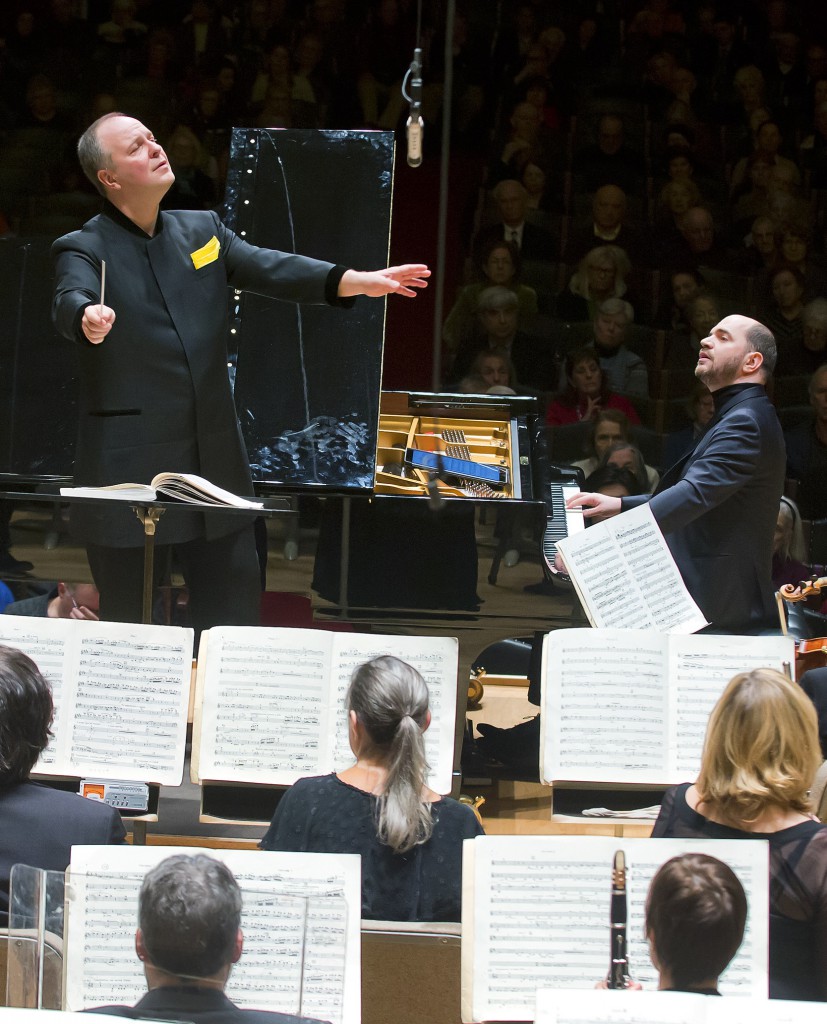Gerstein and Oramo drive Busoni’s epic concerto in belated BSO premiere

Kirill Gerstein performed Busoni’s Piano Concerto with Sakari Oramo and the Boston Symphony Orchestra Friday afternoon at Symphony Hall. Photo: Winslow Townson
Ferruccio Busoni’s Piano Concerto is one of the most curious works of the early twentieth century. Clocking in at 75 minutes and spanning five movements, the piece serves up a crash-and-bang intensity within a veil of mysticism. The final movement even calls for a male chorus to intone the “Prayer to Allah” from Adam Oehlenschläger’s Aladdin and his Wondrous Lamp.
Written between 1901 and 1904, the Piano Concerto has been rarely performed because of the demands placed upon the soloist. The American premiere didn’t take place until 1930, when Karin Dayas performed the work with the Cincinnati Symphony Orchestra under the direction of Fritz Reiner. The Boston Symphony Orchestra has never performed this concerto.
Until now, that is. Friday afternoon at Symphony Hall, pianist Kirill Gerstein and the BSO gave their belated first performance of the sprawling work. Finnish conductor Sakari Oramo led the way.
Busoni scholar Antony Beaumont has argued that the concerto is the work of a master craftsman. Its most engaging aspect is its variety of content. The work reads like a satire of romantic trends. Passages of Brahmsian lyricism swell to statements of Beethovenian power. Wagnerian chromaticism breaks up the charging Lisztian extravagances. And overall, the work is tied together in a Mahlerian superstructure, where disparate elements collide. Busoni, it seems, is summing up an entire era of musical history in one piece.
Friday’s performance provided rich musical rewards, and Gerstein brought the piece off with Herculean power and presence. The Russian-American pianist possesses a stellar technique and he was in firm command of the concerto’s punishing double-octave runs. His tone was powerful for the work’s many climactic points, yet the pianist could pull back for passages of soft serenity.
In the fast movements Gerstein handled the knuckle-busting filigree with precision, and he shaped the phrases of the Scherzo with a dance-like grace. The Tarantella was mesmerizing for its power and brilliance. Gerstein conjured playing of visceral excitement to match the driving statements from the orchestra.
The third movement, with its multi-sectional structure, is showy for a slow movement. There, Gerstein found a tone that was pearly and deep as he crafted the trickling phrases with soulful lyricism.
Under Oramo’s direction, the orchestra supplied sumptuous accompaniment. The conductor was finely attuned to Gerstein’s nuances of phrasing and he built the waving lines into powerful statements that were full and satisfying. The men of the Tanglewood Festival Chorus, prepared by Lidiya Yankovskaya, brought warm radiance to the choral finale.
After the final chords were sounded, the audience showered Gerstein and the musicians with rapturous applause for giving this intriguing work a performance that will linger long in the memory.
The opener, Sibelius’ Symphony No. 3, couldn’t have been more of a contrast in style. If Busoni drew upon arch-romanticism for his concerto, then Sibelius, in this work from 1907, was reacting against it.
Oramo is intimately familiar with Sibelius’ symphonies, having recorded the complete cycle with the City of Birmingham Symphony Orchestra.
Leading with deliberate gestures, he drew playing of cool intensity and momentum from the BSO. The agitated statements of the first movement flowered into passages that bounced with a bucolic verve. Oramo took time to shape the principal theme of the second movement in vocal arcs. The theme took on a dance quality as the movement progressed and culminated in a lilting conclusion. The syncopations of the third movement were given palpable weight, and the closing theme built to statements of sturdy power, with the final chord resonating in the hall.
The program will be repeated 8 p.m. Saturday at Symphony Hall. bso.org; 888-266-1200
Posted in Performances



